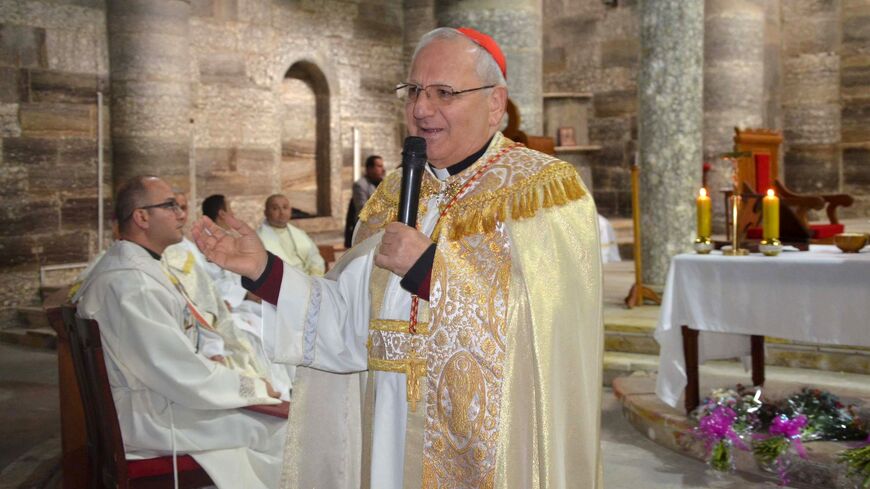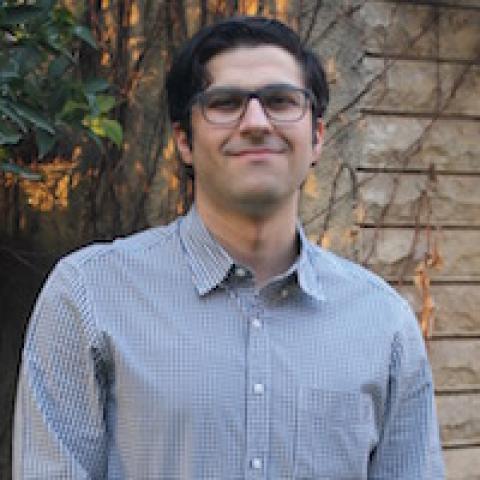A dispute between the Iraqi government and the Chaldean Catholic Church has prompted the church's patriach to move from Baghdad to the Kurdistan Region, and is inflaming tensions with the United States.
The issue relates to Iraqi President Abdul Latif Rashid revoking a decree that codified the patriarch's management of the community endowment, as well as the escalating battle between the church and an Iran-backed Iraqi Christian leader.
Background
On July 3, Rashid revoked a 2013 decree that recognized Patriarch Louis Sako as head of the Chaldean Catholic Church and allowed the religious leader to administer the community’s endowment. Rashid said the decree had no constitutional basis, according to Agence France-Presse.
The Chaldean Catholic Church is based in Iraq and is in communion with Rome. Iraq’s Aramaic-speaking Christians are divided into communities identifying as Chaldean, Assyrian and Syriac. Sako is based in Baghdad, though the majority of Christians now live in the northern Nineveh province and the autonomous Kurdistan Region.
The Chaldeans, Assyrians, and Syriacs form one of the oldest Christian communities in the world. There were around 1.5 million Christians in Iraq before the US invasion in 2003, but the population has since dwindled to around 150,000. The community faced several attacks in the chaos following the war, most notably by the Islamic State (IS) in 2014.
Rashid's revocation follows a months-long war of words between Sako and Rayan al-Kaldani, the head of the Babylon Movement armed group and political party. The Babylon Movement was founded in 2014 to fight IS alongside the predominantly Shiite groups in the Popular Mobilization Units (PMU). Babylon has been accused of illegal land seizures in the Nineveh province and corruption.
During Iraq’s most recent elections in 2021, the Babylon Movement won four of the five seats allocated to Christians in the Iraqi parliament. A 2021 report from Chatham House noted that some of the Babylon Movement’s voters are actually Shiite Muslims from southern Iraq.
The revocation of the decree has led to an ongoing controversy in Iraq. Last week, there was a protest in the predominantly Christian town of Ankawa in the Kurdistan Region against the move, the Kurdish news outlet Rudaw reported.
Last Saturday, the Chaldean Patriarchate published an open letter from Sako announcing that he is moving from Baghdad to a monastery in the Kurdistan Region because of “the deliberate and humiliating campaign led by the Babylon Brigades.”
The same day, Kaldani issued a statement clarifying that the Babylon Movement is a “political movement” and not “brigades,” as Sako described them. He also said, “We confirm that the decision to revoke the decree was a decision of the republic’s presidency, not Babylon’s.”
On Monday, Rashid met with the head of the Vatican Embassy in Iraq, Father Charles Ssuuna.
“The Holy See does not have any observations or objections regarding the procedures of the Presidency of the Republic,” said Ssunna, according to a statement from the presidency.
However, the Vatican Embassy in Baghdad also issued a statement on Monday, saying it "regrets the misunderstandings and inappropriate dealings concerning the role of ... Sako as the custodian of the properties of the Chaldean Church," according to Reuters.
Rashid also tweeted on Monday that his decision "is not an attack" on the Chaldean Church, adding that it "does not impact His Eminence’s (Sako's) status or ability to conduct his duties."
The Vatican embassy in Washington did not respond to Al-Monitor's request for comment. The Iraqi embassy was unable to comment before publication.
The revocation is only the latest setback to befall Iraqi Christians since 2003. The Chaldean Catholic Church is one of the most prominent churches in Iraq, and the issue has led to significant concern in the wider Christian community.
An ‘ongoing effort undermine the patriarch’
Other Chaldean officials have criticized the revocation of the decree. Bashar Warda, the Archbishop of Erbil in the Kurdistan Region, told Al-Monitor, “The President of the Republic could have convened a meeting with all the church leaders to explain the history of these decrees and his decision to retract them. Instead, the matter was played out in the media.”
Warda, whose archdiocese includes Ankawa, said that churches have authority to independently manage their endowments per the Iraqi constitution. "The Ministry of Justice should issue an authority document for each church head, granting them the power to manage the endowments as per the ecclesiastical laws," he said.
The archbishop also noted that the patriarchs of the Assyrian Church and the Old Assyrian Church requested similar decrees earlier this year, but were denied.
One Iraqi researcher, who asked to remain anonymous due to possible militia threats, said that Kaldani instigated the president to revoke the decree under the justification that Babylon holds most of the Christian seats in parliament. “It is part of their ongoing effort undermine the patriarch and centralize authority for Iraqi Christians to themselves,” the researcher told Al-Monitor, adding that there is now "confusion" in the community over who controls endowments.
Iran’s influence
The Babylon Movement is regularly described as a pro-Iran group. Iran’s allies in Iraq oppose Sako for a number of reasons, including his support for the anti-government Tishreen protests that began in 2019, according to the researcher.
The researcher also noted that there is a dispute among Iraqi Christians over control of the abundant property left behind by Christians in Baghdad and Nineveh. Thousands of Christians have fled these areas in recent years, including after the rise of IS in 2014.
Some observers allege that Iran-backed groups have been involved in the seizure of Christian land in order to foster demographic change. In a 2019 report, the US-based Assyrian Policy Institute referenced a plan by Nineveh authorities to build new settlements in a part of the Hamdaniya District controlled by the Iran-backed Brigade 30 of the PMU. The proposal included the "seizure of agricultural lands belonging to Assyrians" and "alarmed members of the local Assyrian community who fear demographic change,” according to the report.
Bilal Wahab, a senior fellow at the Washington Institute for Near East Policy, said that Iran has a history of supporting politicians from different religious backgrounds, pointing to Lebanon as an example, “whether they’re Shia, Sunni, Christian, or whatever.”
The dispute over the decree ties into Iraqi politics in numerous ways. Wahab said that Iraq has been experiencing more intra-community competition recently, such as the tensions between the two main Kurdish parties.
“Iraqi politics used to be a competition among the different communities. Much of the competition has actually shifted to intra-community. I think this one among the Chaldeans follows that trend,” Wahab told Al-Monitor.
To a lesser extent, Wahab said the dispute between Sako and Kaldani is related to tensions between the two main Kurdish parties in Iraq. The Kurdistan Democratic Party (KDP) is led by the Barzani family, while the the Patriotic Union of Kurdistan (PUK) is led by the Talabanis. Rashid is a member of the PUK.
“Sako has been closer to the Barzanis than he has been to the Talabanis. On the other hand, Kaldani has been becoming increasingly friendly with Bafel Talabani,” said Wahab, referencing the current PUK leader.
Wahab also noted that the KDP was pleased with Sako for helping bring Pope Francis to Erbil in 2021.
US response
US State Department spokesman Matthew Miller told reporters on Tuesday, “We are disturbed by the harassment of Cardinal Sako, the patriarch of the Chaldean Church, and troubled by the news that he has left Baghdad. We look forward to his safe return."
Miller also noted that Kaldani was sanctioned by the US government in 2019 for alleged human rights abuses and corruption.
Rashid responded to Miller's comments on Wednesday, saying he would summon the US ambassador over the issue.








